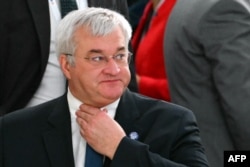The top Russian and U.S. diplomats, Sergey Lavrov and Antony Blinken, traded sharp words Thursday at an international security conference over Moscow’s nearly three-year war in Ukraine, with each blaming the other’s country for escalating the conflict.
Lavrov, the Russian foreign minister, accused the West of reviving the Cold War with its arms support for Kyiv’s forces and provoking a confrontation with Russia "with a far greater risk of its escalation into a hot phase."
Lavrov, speaking at the Organization for Security and Cooperation in Europe ministerial meeting in Malta, said U.S. support for Ukraine was driven by a desire to "return NATO to the political spotlight," claiming that “after the Afghan disgrace, there was a need for a new common enemy.”
Lavrov, in his first visit to a European Union country since Russia's full-scale invasion of Ukraine in February 2022, also accused Washington of military exercises in the Asia-Pacific region that sought to "destabilize the entire Eurasian continent."
Lavrov then left the meeting before waiting to hear a response from Blinken, the U.S. secretary of state, and other speakers.
"Let's talk about escalation,'' Blinken said, citing the deployment of about 10,000 North Korean forces to fight alongside Russian troops, the use of an intermediate-range ballistic missile to attack Ukraine, Russia's move to lower the threshold for the use of nuclear weapons, and attacks on Ukraine's energy infrastructure.
"Mr. Lavrov spoke about the sovereign right of every member-state to make their own choices,'' Blinken said. "That's exactly what this is about: the sovereign right of Ukraine and the Ukrainian people to make their own choices about the future, not to have those choices made in and by Moscow."
Ukraine's Foreign Minister Andrii Sybiha, who had been the first to address the meeting, walked out as Lavrov took the podium, along with the foreign ministers of Poland and Estonia
Sybiha, in his comments, called Lavrov a "war criminal."
“Ukraine continues to fight for its right to exist. And the Russian war criminal at this table [Lavrov] should know this: Ukraine will succeed, and justice will prevail,” Sybiha said.
"Russia is not a partner; it is the biggest threat to our common security. Russia's participation in the OSCE is a threat to cooperation in Europe," Sybiga told OSCE ministers.
"When Russians say they want peace, they lie," he said.
Officials said Blinken had no intention of meeting with Lavrov at the conference.
The OSCE was founded in 1975 to ease tensions between the East and the West during the Cold War, and now counts 57 members from Turkey to Mongolia, including Britain and Canada as well as the United States.
It helps its members coordinate issues such as human rights and arms control, but Lavrov at the last ministerial summit a year ago in North Macedonia accused the OSCE of becoming an "appendage" of NATO, the West’s main military alliance, and the EU.
Ukraine has called for Russia to be excluded from the organization and boycotted a previous summit over Lavrov's attendance.
Summit host Ian Borg, Malta's foreign minister, opened proceedings Thursday with a call for Russia to withdraw from Ukraine. Many other participants also assailed Moscow's aggression in Ukraine.
While the U.S. has continued to ship arms to Ukraine, President-elect Donald Trump has voiced skepticism about continued support. He has said he will resolve the war before his January 20 inauguration but has not said how.
Amid that uncertainty, Ukraine's Defense Ministry announced Thursday that it plans to supply its armed forces with more than 30,000 long-range attack drones in 2025.
"These next-generation drones can operate autonomously over long distances and strike enemy targets with high precision," the ministry said in a post on the social media platform X.
International partners helped fund the production, the ministry added.
Also on Thursday, Ukrainian President Volodymyr Zelenskyy said his country had not received sufficient help from the United Nations or Red Cross in bringing back Ukrainians held in Russia.
"Do we currently receive much assistance from organizations such as the U.N. or the International Committee of the Red Cross in protecting and securing the return of Ukrainian prisoners held in Russia? In fact, we do not," Zelenskyy said at a human rights conference in Kyiv.
The Ukrainian government says Russia is holding thousands of civilians in captivity, including politicians and journalists.
"We all see, in particular, how weak the world's response is to what Russia is doing to Ukrainian prisoners," Zelenskyy said.
Kyiv also says Moscow has abducted about 20,000 Ukrainian children since the war began. The Russian government denies wrongdoing.
Some information is from Reuters, The Associated Press and Agence France-Presse.






